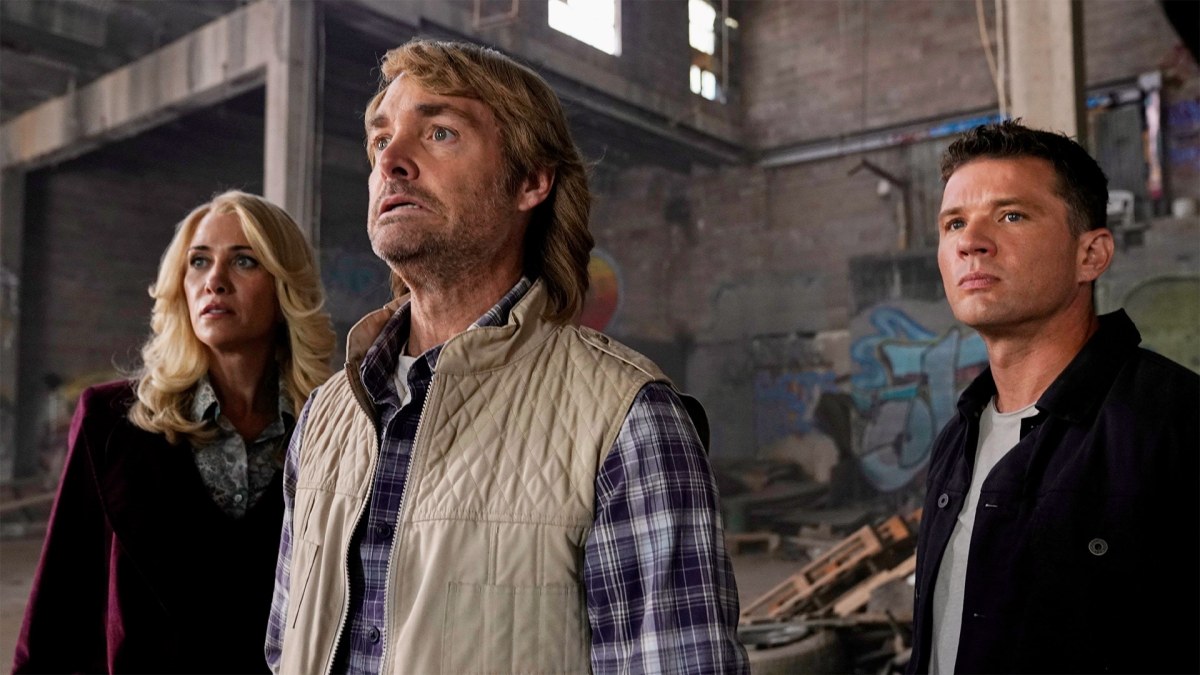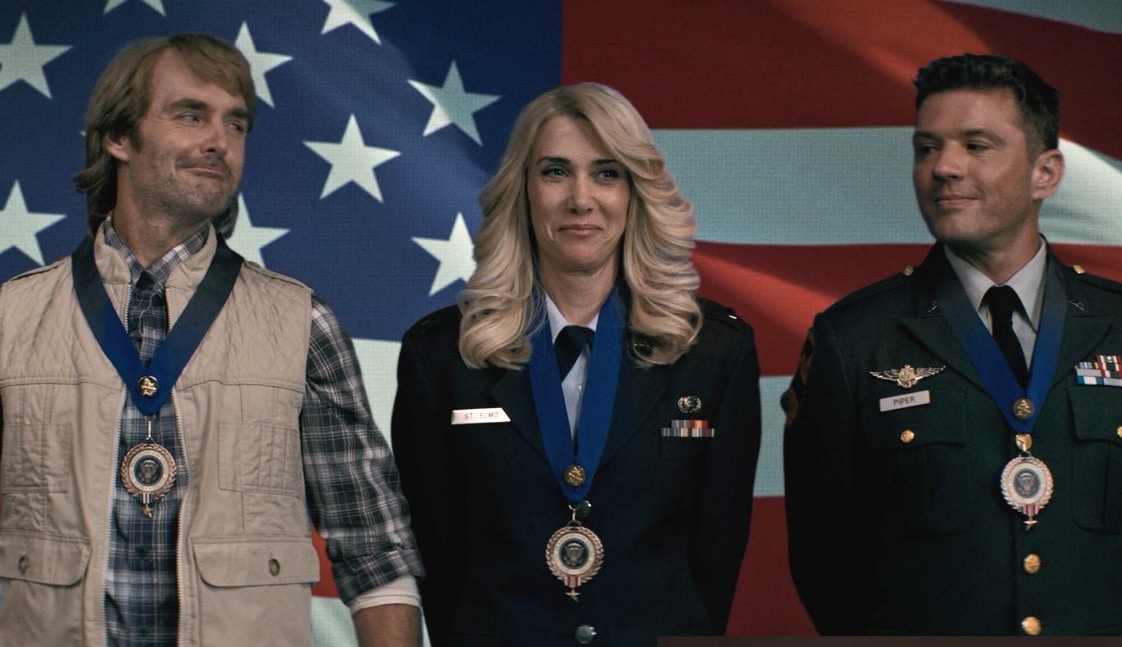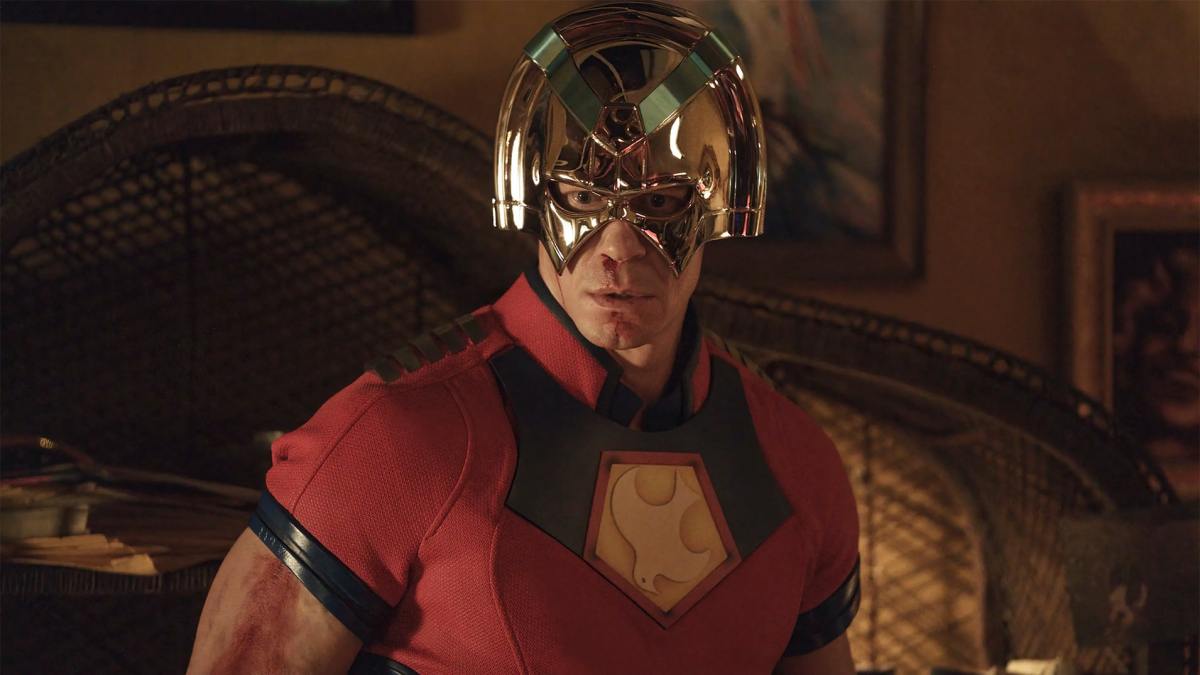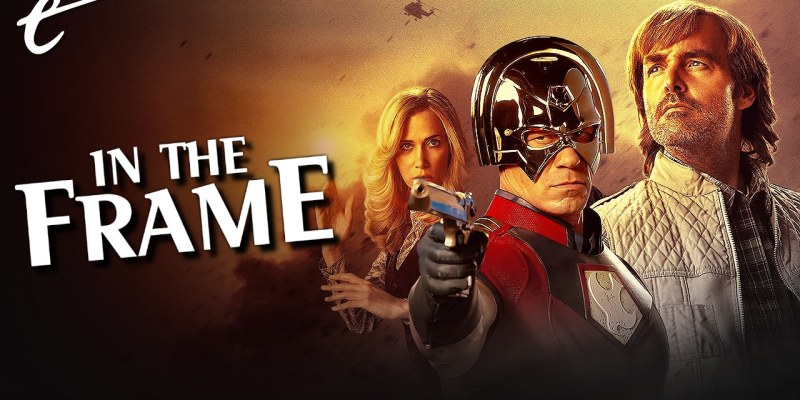They say that history repeats itself: first as tragedy, then as farce. Both Peacemaker and MacGruber suggest that America’s vision of its 1980s self has veered sharply into farce.
Streaming on Peacock, MacGruber is a long-delayed television spin-off from the movie of the same name. Adapted from a Saturday Night Live sketch riffing on 1980s television classic MacGyver, the film starred Will Forte as the eponymous action hero. While the sketches had a relatively narrow focus, the film expanded its scope. MacGruber was a character who evoked a very specific moment in American culture, with his glorious mullet and his aviator sunglasses.
Critics acknowledged the film as “a pastiche of pure Reagan-era cheese.” In an early review from the SXSW film festival, Karina Longworth noted the film’s “nostalgia for late-Reagan-era notions of badassery.” In a retrospective assessment of the movie, Nathan Rabin described the titular hero as “an exemplar of Tom Cruise-style, all-American, overconfident douchebaggery.” It was a film that channeled and mocked the excesses of the 1980s action hero.
Maybe the culture wasn’t ready. MacGruber bombed at the box office and earned negative reviews, although it quickly developed a cult reputation. Interestingly, MacGruber arrived on the crest of a wave of more earnest nostalgia for the decade. It was released the same year as remakes of Clash of the Titans, The Karate Kid, and The A-Team, the same-title prequel The Thing, and the long-delayed sequel Wall Street: Money Never Sleeps. These were all more sincere tributes to the era.
In contrast, MacGruber is a much more acerbic take on a familiar archetype. The lead character is a decorated military veteran who plays by his own rules, who has promised to serve his country and will always succeed in the face of overwhelming odds. He is also a complete asshole. MacGruber himself is a gleefully unlikeable protagonist, taking all the arrogance and aggression associated with the macho heroes of the decade and somehow turning the dial way up.

MacGruber is an aggressively American archetype. In the fourth episode of the streaming series, MacGruber offers a stirring speech about why the world deserves to be saved, steeped in Americana. “I kinda like the world,” he opines. “I like sunsets. I like snow-capped mountains. I like kicking back with a cold Molson and watching the game. I like babies and kettle corn, monster trucks and puppy dogs.” The music swells in the background. MacGruber is America.
In the premiere, General Barrett Fasoose (Laurence Fishburne) describes the character as “America’s finest soldier.” The final shot of the first season pans up from an impromptu dance party to catch fighter jets flying overhead, leaving trails of red, white, and blue in the sky. Digging through MacGruber’s record in the penultimate episode, Major Harold Kernst (Joseph Lee Anderson) finds photos of MacGruber receiving medals from every president dating back to Reagan.
However, MacGruber is also a bleak deconstruction of this expression of patriotism. MacGruber is a reflection of the fantasy of 1980s action heroes like the version of John Rambo (Sylvester Stallone) who appeared in the later Rambo movies. Many 1980s action movies could be read as attempts to re-legislate the trauma of the Vietnam War. MacGruber is riffing on that idea, presenting its hero as an unstoppable and remorseless killing machine with glib one-liners.
“If we’d had two Rambos, we’d have won the war,” a veteran told The Los Angeles Times in February 1987. In April 1987, a letter to The Washington Post sarcastically mused, “What would it have taken for a U.S. victory? More brave, well-muscled law-and-order guys in the mold of Rambo/Stallone.” MacGruber blends this fantasy of victory with an acknowledgement of real-world atrocities. Reading MacGruber’s file, Kernst focuses on an ominous note, “First soldier to record 10,000 civilian kills.”

MacGruber isn’t the only recent streaming series to filter this retro action movie heroism through a blackly comic lens. Peacemaker is similarly rooted in the 1980s, interrogating the decade’s masculine ideal. Like MacGruber, the eponymous superhero (John Cena) is a riff on the era’s hyper-patriotic action heroes. Peacemaker even has a pet eagle, named “Eagly.” Unlike a lot of other superhero movies and television shows, Peacemaker is also explicitly working for the American government.
This shouldn’t be a surprise. Peacemaker is a spin-off of The Suicide Squad. James Gunn’s movie was an adaptation of John Ostrander and Luke McDonnell’s classic 1980s run, which literally began with President Ronald Reagan approving the formation of the eponymous team. Gunn’s film is set in a similar milieu, to the point that background materials include footage of Ronald Reagan with the former leader of Corto Maltese.
The Suicide Squad filmed in Panama, and the production has drawn some criticism for its approach to the region. Like MacGruber, the film riffs on 1980s action movies. The premise recalls that of Predator, with a team of hard-bitten commandos encountering an alien menace while on a secret mission in a nebulously defined Central American country. Predator is also a secret Vietnam movie, with writer John Thomas conceding, “If this was a few years earlier, it would have been set in Vietnam.”
The Suicide Squad is, at least in part, a critique of American intervention in the region during the 1980s, which would include the United States’ tangled history with Panama itself. Like MacGruber, The Suicide Squad adopts a blackly comic approach to these horrors. Amanda Waller (Viola Davis) is not presented as a mastermind maneuvering according to a larger plan, but instead an operator with tremendous power acting recklessly to cause chaos and suffering.

Indeed, it’s possible to read the marauding monster Starro itself as a metaphor for American interventionism. It might not have any stripes, but it is a giant star. The movie’s climax finds the behemoth rampaging through Corto Maltese, leaving a trail of devastation in its wake, seeking only to extend its influence and swallow this small nation. Of course, Starro is also a victim of American action, effectively awakened and angered by the inhuman treatment it received at American hands.
In The Suicide Squad, Peacemaker is defined by his blind patriotism. He is so tied to the idea of American exceptionalism that he is willing to kill U.S. Army colonel Rick Flag (Joel Kinnaman) to protect the nation’s dirty little secrets. However, Peacemaker is haunted by Flag’s taunting last words, “Peacemaker. What a joke.” These words shape a lot of the character’s portrayal in Peacemaker, presenting this retro action hero as a sad and broken man living in a run-down trailer painted like the American flag.
Both MacGruber and Peacemaker comment on the extreme patriotism that ran through the action movies of the 1980s. In Cobra, the eponymous vigilante police officer (Stallone) keeps a portrait of Reagan in his office. Top Gun was filmed with the support (and feedback) of the armed forces, leading to a recruitment boom. For the United States government, the question of participation in such projects often came down to whether a given portrayal would “benefit” the military.
There are perhaps reasons why projects like MacGruber and Peacemaker are more skeptical of such military jingoism. If those 1980s action movies existed in the shadow of the Vietnam War, then MacGruber and Peacemaker exist in the wake of traumatic foreign interventions in Iraq and Afghanistan. Both shows premiered in the aftermath of the dramatic withdrawal of American troops from Afghanistan, following two decades of involvement in the region. Perhaps cynicism is earned.

There are perhaps other reasons why both MacGruber and Peacemaker temper their nostalgia for the 1980s with a healthy skepticism. Both projects were released in the wake of the presidency of Donald Trump. Trump was a figure very much rooted in 1980s iconography. It isn’t just his history within the decade, but his whole aesthetic. Trump evoked characters like Gordon Gekko (Michael Douglas) from Wall Street. Trump even had a (cut) cameo in the 2010 sequel, Money Never Sleeps.
As such, it perhaps makes sense that MacGruber and Peacemaker reduce their 1980s action heroes to jokes. These are absurd caricatures of heroes, characters who will do terrible things in service of their own black-and-white morality. That said, both shows retain some sympathy for their characters, infantilizing these unstoppable killing machines. MacGruber and Peacekeeper’s aggressive and overconfident exteriors mask deep-seated insecurities and vulnerabilities.
There is a valid argument about the extent to which infantilizing these characters serves to absolve them of their more unpleasant characteristics. There is also a valid debate to be had over the kinds of characters who receive this sort of sympathetic-underneath-it-all treatment. However, there is also something to be said for finding the dark humor in the excess of 1980s action movies and suggesting that maybe it is time for the archetype to grow up.
